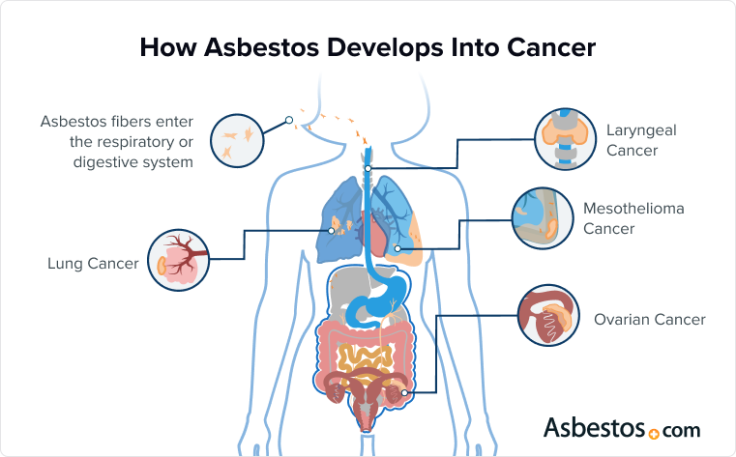Get Your Free Mesothelioma Guide

Find a Top Mesothelioma Doctor

Access Help Paying for Treatment

Asbestos is a toxic mineral that can cause several types of cancer when its fibers are inhaled or ingested. These fibers become lodged in tissue, causing inflammation and scarring that can develop into mesothelioma, lung cancer and other asbestos-related cancers.
Asbestos exposure causes mesothelioma cancer when its fibers are inhaled or ingested. They can become stuck within sensitive tissue around your lungs or belly, causing inflammation and cell damage over many years. Both the International Agency for Research on Cancer and the U.S. Environmental Protection Agency classify all types of asbestos as carcinogens.
As the fibers damage DNA over time, genetic changes lead to abnormal cell growth and cancer. The latency period between exposure and cancer development typically ranges from 10 to 60 years. Asbestos exposure causes half of all work-related cancer deaths.
Asbestos can also contaminate products that contain other minerals such as talc. The presence of asbestos in talc increases your risk of developing various cancers, including ovarian cancer and mesothelioma.

Asbestos exposure is known to cause mesothelioma, lung cancer, laryngeal cancer and ovarian cancer. Mesothelioma and lung cancer are the most frequently diagnosed types of asbestos cancer.
Higher exposure levels and longer durations increase the risk of asbestos-related cancers and shorten the latency period. According to the World Health Organization, approximately 200,000 deaths are connected to occupational asbestos exposure.
Key Facts About Types of Asbestos Cancer
A comprehensive analysis was published in March 2024 on the global burden of occupational asbestos exposure. It reported, “Asbestos fibers are mainly inhaled with air, and have local carcinogenic effects on target organs (lungs, larynx, ovaries) and related serous membranes (pleura, pericardium, peritoneum, vaginal membranes), resulting in lung cancer, larynx (throat) cancer, ovarian cancer, pleura and peritoneal mesothelioma.”
The authors emphasized no amount of asbestos exposure is safe. The authors also noted asbestos-related ovarian cancer “has been designated as the first gynecological occupational disease in Germany.” It was also noted that “the risk of ovarian cancer was approximately doubled” in women with occupational asbestos exposure.
About 75% of mesothelioma cancer cases form in the protective lining around the lungs, known as the pleura. Approximately 20% of mesothelioma cases develop in the lining of the belly, known as the peritoneum. The time from initial asbestos exposure to diagnosis typically ranges from 20 to 60 years.
A recent research study discovered 80% of pleural mesothelioma patients have a history of direct or indirect asbestos exposure. Another recent research paper noted an estimated 43,000 deaths occur globally every year from mesothelioma and asbestos-related diseases, or roughly 5 to 10 deaths every hour. The average life expectancy for mesothelioma patients is 12 to 21 months with treatment.
Asbestos-related lung cancer kills twice as many Americans each year as mesothelioma. Asbestos exposure was the primary cause of about 4% of the approximately 234,580 total new lung cancer cases in 2024.
Unlike mesothelioma, lung cancer develops inside your lungs. Combining tobacco and asbestos exposure significantly increases the risk of developing lung cancer, but not mesothelioma.
About 63% of people diagnosed with localized lung cancer live 5 years or more. Conversely, the 5-year survival is 7% for lung cancer patients with late-stage or metastatic disease (many cancer cells travel to different organs in the body).
Get Your Free Mesothelioma Guide

Find a Top Mesothelioma Doctor

Access Help Paying for Treatment

Inhaled asbestos fibers can lodge in your voice box as they pass through your windpipe (trachea) on the way to your lungs and cause cancer. A combination of smoking, heavy alcohol use and asbestos exposure significantly increases the risk of laryngeal (throat) cancer.
About 12,650 cases of laryngeal cancer occurred in 2024. Researchers discovered in 2021 that 50% of workers with a history of occupational asbestos exposure had asbestos fibers (the chrysotile type) near their tumor sites.
Ovarian cancer involves abnormal growth of cells within your ovaries. In 2024, approximately 19,680 women received a diagnosis of ovarian cancer. Ovarian cancer is the fifth most common cancer among women. It causes more deaths than other reproductive cancers in women.
Recent medical research has established asbestos exposure is one cause of ovarian cancer, which the IARC first confirmed in 2009. A study found evidence of asbestos fibers in 80% of talcum powder product-related ovarian cancer cases.
There is a correlation between asbestos exposure and other types of cancer. The IARC and other groups are conducting ongoing research to determine if asbestos is a definitive cause of these cancers.
The IARC identified 3 types of cancer “positively associated” with asbestos exposure: Pharyngeal (throat), stomach and colon cancer. This means there is some evidence of a link, but there isn’t strong enough data to conclude asbestos definitively causes these diseases.
Many risk factors for cancers that get the least attention involve exposure to toxic materials. Asbestos can damage sensitive organs throughout the body and eventually cause cancer. If you have experienced exposure or have a family history of cancer, inform your provider.
Asbestos-related cancers, such as mesothelioma and lung cancer, primarily affect individuals exposed to asbestos fibers, which were widely used in construction, manufacturing, and other industries until the late 20th century.
Those at highest risk include people who worked directly with asbestos-containing materials, as well as those who experienced secondary exposure through family members or environmental contact. Since symptoms often take decades to appear, many cases are diagnosed years after exposure.
Groups at Higher-Risk for Asbestos Cancer
Occupational exposure from many blue-collar professions remains the leading risk factor for asbestos-related cancers. This is particularly the case in industries that heavily relied on asbestos before regulations were enforced.
The U.S. military used asbestos throughout most of the 20th century, causing asbestos cancer in thousands of veterans. For example, the U.S. Navy used a lot of asbestos in ships, boiler rooms, engine rooms and insulation, causing significant exposure rates among veterans.
Secondary exposure is also a concern, as family members of workers could inhale fibers carried home on clothing, skin, hair and shoes. Even those who didn’t work directly with asbestos, such as people living near mines or old industrial sites, may face elevated risks. Early detection and understanding exposure history are crucial for improving outcomes.

Joey Barna
Former HVAC Mechanic, Mesothelioma Survivor Shares His Story
Pleural mesothelioma survivor Joey Barna tells us he was exposed to asbestos working in HVAC and restoring old pipes. He recounts, “There were just a lot of old buildings that I worked in. I also worked on old boilers, which were encased in asbestos. At that time, asbestos was considered a state-of-the-art insulator. It was fireproof.”
Joey Barna
The most common symptoms of mesothelioma and other asbestos cancers include breathing problems, digestive issues, fatigue, fever and pain. The earliest symptoms can mimic more common respiratory or abdominal cancers.
Asbestos cancer symptoms differ depending on the location of your tumors. Notifying your doctors of symptoms is the best way to receive an early diagnosis. An early and accurate diagnosis can improve your survival and the options to treat mesothelioma and other cancers.
Common Asbestos Cancer Symptoms
In addition to the physical effects of cancer, over time, long periods of pain can cause emotional symptoms as well. These can include stress, fear, anxiety and depression.
If you have a history of asbestos exposure, talk to your doctor about regular health screenings. They should pay special attention to signs that may signal cancer.
Surgery, chemotherapy and radiation are the primary treatment options for asbestos cancer. Treatment success varies, and what works well for one person may be ineffective for another. It’s important to find a doctor specializing in mesothelioma and other asbestos cancers.
Common Treatments for Asbestos-Related Cancer
Newer studies in 2025 highlight advancements in combination therapies, such as immunotherapy paired with chemo or targeted drugs. A 2025 study in The Lancet Oncology found that a dual immunotherapy approach of Yervoy (ipilimumab) with Opdivo extended progression-free survival in people with malignant pleural mesothelioma. Additionally, clinical trials exploring CAR T-cell therapy and novel immunotherapies are underway, offering hope for more effective treatments.
Treatment for asbestos cancer can incur high costs, including travel expenses to cancer centers. Clinical trials can offer a chance at free or low-cost emerging therapy. Our Financial Aid for Cancer Patients Guide also outlines several types of financial compensation.
To avoid asbestos exposure, wear proper personal protective equipment like respirators and disposable full-body cover suits. Avoid disturbing fragile asbestos-containing materials in buildings. Sealing asbestos areas instead of removing it may also be an option. OSHA, NIOSH and the EPA publish regulations and safety standards for handling and removing asbestos in workplaces, schools and older buildings.
If you could be exposed to legacy asbestos in old equipment or buildings in the course of your job as a construction worker, firefighter, military service member or industrial worker, speak with your employer and union about safety protocols. Teachers and custodians have also developed asbestos-related cancers from legacy asbestos in schools.
How Employers Should Protect Workers
While employees should follow safety guidelines to protect themselves, companies are responsible for the safety of their employees. Companies that once manufactured asbestos products are responsible for the safety of their products. Workers at the height of asbestos use in the mid-20th century were often unaware of the dangers. Many weren’t provided adequate protection.
People exposed to asbestos 20 to 60 years ago may only be diagnosed with related cancers now. If you have a history of asbestos exposure, alert your doctor. Screening tests can detect early signs of asbestos cancer. If you’ve experienced an asbestos-related injury or illness, our Patient Advocates can help you find a specialist, file your VA-benefits claims and connect with an asbestos cancer attorney. An experienced lawyer can help you file an asbestos trust fund claim or lawsuit seeking compensation.
Asbestos-related cancers, such as mesothelioma or lung cancer, are typically diagnosed through a combination of imaging tests (X-rays, CT scans or MRIs), biopsies (tissue samples analyzed in a lab) and patient history reviews to confirm asbestos exposure. Blood tests for protein biomarkers, like fibulin-3 or mesothelin-related peptides, may also aid in detection, though imaging and biopsy are the gold standard.
Currently, there is no definitive cure for asbestos-related cancers, but treatments like surgery, chemo, radiation and immunotherapy can help manage the disease, extend survival and improve quality of life. Emerging therapies, including immunotherapy combinations and targeted drugs, show promise in clinical trials, offering hope for better long-term outcomes.
No, asbestos exposure doesn’t always lead to cancer, but it significantly increases the risk. Factors like duration of exposure, type of asbestos fibers and individual health play a role. While some people develop mesothelioma, lung cancer or asbestosis, others may never show symptoms, though there is no safe level of asbestos exposure.
Stay up-to-date on treatment, research, clinical trials, doctors and survivors
The information on this website is proprietary and protected. It is not a substitute for professional medical advice, diagnosis or treatment. Any unauthorized or illegal use, copying or dissemination will be prosecuted. Please read our privacy policy and terms of service for more information about our website.
This website and its content may be deemed attorney advertising. Prior results do not predict a similar outcome.
The Mesothelioma Center’s claim as the most trusted resource is based on our more than 150 5-star Google and BBB reviews. Our organization also helps more than half of all mesothelioma patients annually diagnosed.
Your web browser is no longer supported by Microsoft. Update your browser for more security, speed and compatibility.
If you are looking for mesothelioma support, please contact our Patient Advocates at (855) 404-4592
The Mesothelioma Center at Asbestos.com has provided patients and their loved ones the most updated and reliable information on mesothelioma and asbestos exposure since 2006.
Our team of Patient Advocates includes a medical doctor, a registered nurse, health services administrators, veterans, VA-accredited Claims Agents, an oncology patient navigator and hospice care expert. Their combined expertise means we help any mesothelioma patient or loved one through every step of their cancer journey.
More than 30 contributors, including mesothelioma doctors, survivors, health care professionals and other experts, have peer-reviewed our website and written unique research-driven articles to ensure you get the highest-quality medical and health information.
My family has only the highest compliment for the assistance and support that we received from The Mesothelioma Center. This is a staff of compassionate and knowledgeable individuals who respect what your family is experiencing and who go the extra mile to make an unfortunate diagnosis less stressful. Information and assistance were provided by The Mesothelioma Center at no cost to our family.LashawnMesothelioma patient’s daughter


Asbestos.com. (2025, November 19). Asbestos Cancer. Retrieved February 26, 2026, from https://www.asbestos.com/cancer/
"Asbestos Cancer." Asbestos.com, 19 Nov 2025, https://www.asbestos.com/cancer/.
Asbestos.com. "Asbestos Cancer." Last modified November 19, 2025. https://www.asbestos.com/cancer/.
We Thoroughly vet individuals who are experts in their field to contribute to articles on Asbestos.com. We believe in the integrity and quality of our educational materials, and only publish information that is relevant, factual, and backed by experts.

Karen Selby is a registered nurse and Board Certified Patient Advocate at The Mesothelioma Center with more than 30 years of experience in oncology and thoracic surgery. She worked as an operating room nurse in thoracic surgery at the University of Maryland for 6 years, assisting with surgeries such as lung transplants, pneumonectomies and pleurectomies. She later served as regional director of the tissue procurement program at the University of Florida. Karen joined The Mesothelioma Center in 2009, providing patients with personalized support and resources.
Our fact-checking process begins with a thorough review of all sources to ensure they are high quality. Then we cross-check the facts with original medical or scientific reports published by those sources, or we validate the facts with reputable news organizations, medical and scientific experts and other health experts. Each page includes all sources for full transparency.
Please read our editorial guidelines to learn more about our content creation and review process.
